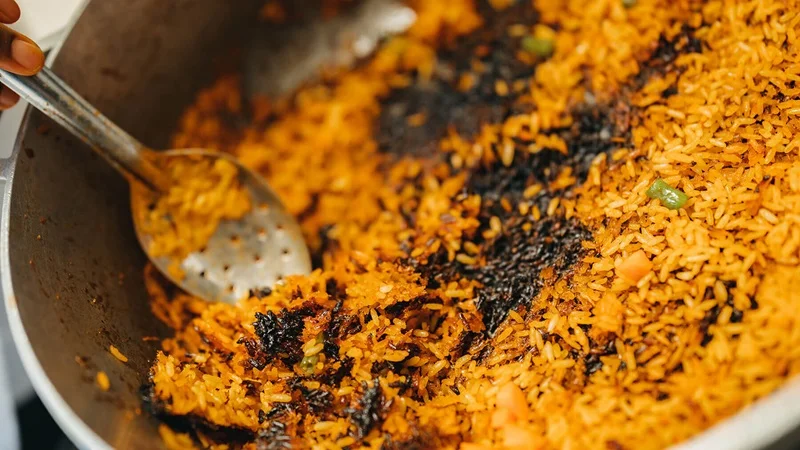We’ve all had those moments in the kitchen: you take your eyes off the stove for just a second, and suddenly your food is charred beyond recognition. While it might feel like a harmless slip-up, burnt food can actually pose serious health risks. When food is overcooked, it undergoes chemical changes that release harmful compounds, making it more than just a little crispy. Regularly eating burnt food can lead to significant health consequences over time.
In this article, we’ll explore the reasons why you should think twice before indulging in burnt food and how making simple adjustments in the kitchen can safeguard your health. Let’s take a closer look at the impact of burnt meals on your well-being.
7 Reasons you should Avoid Eating Burnt Food.
Acrylamide, a key player in this concern, is a neurotoxic substance that can damage nerve cells and disrupt your body’s defenses. Its harmful effects accumulate over time, meaning that even small, regular doses can increase the risks to your organs. So, while that burnt toast or overcooked steak might seem like a minor inconvenience, it’s important to recognize the potential dangers.
It causes Cancer
When food is burnt, it undergoes chemical transformations that produce harmful compounds. Among these are Polycyclic Aromatic Hydrocarbons (PAHs), Heterocyclic Amines (HCAs), and Acrylamide. These substances are linked to an increased risk of several types of cancer, including colorectal, breast, and prostate cancer. For instance, acrylamide is particularly concerning; it’s classified as a probable human carcinogen. Regularly consuming burnt food can raise your long-term cancer risk, making it wise to keep an eye on your cooking.
READ ALSO: Top 10 Health Benefits of Eating Dates
It causes Brain Damage
Burnt food also contains neurotoxins like Advanced Glycation End-products (AGEs) and lipid peroxides. These compounds can negatively affect your nervous system, potentially leading to cognitive issues. While the exact mechanisms are still being studied, it’s believed that acrylamide may attack structural proteins in nerve cells or inhibit the anti-inflammatory systems that protect them from damage. The effects of acrylamide are cumulative, meaning that even small amounts over time could heighten your risk of neurological conditions, including Alzheimer’s or Parkinson’s disease.
Digestive Difficulties
Eating burnt food can irritate your digestive tract. The charred parts may lead to inflammation, causing discomfort such as heartburn, bloating, diarrhea, and stomach pain. Additionally, burnt food can produce compounds that contribute to oxidative stress, which can worsen digestive health. Your gut needs to be in good shape for overall wellness, and burnt meals don’t help.

Heart Health Risks
Burnt food isn’t just bad for your digestive system; it can also impact your heart. Regularly consuming charred foods may raise your blood pressure and cholesterol levels while damaging blood vessels. This combination can significantly increase your risk of cardiovascular diseases, including heart attacks and strokes. Protecting your heart should be a priority, and avoiding burnt food is a simple yet effective step.
Weakened Immune System
The compounds in burnt food can weaken your immune response, making it harder for your body to fight off infections. A weakened immune system can leave you more vulnerable to illnesses over time. Keeping your defenses strong is crucial, especially during cold and flu seasons, and avoiding burnt meals can contribute to a healthier immune system.
Breathing Problems
Let’s not forget about the smoke and fumes produced when food burns. Inhaling this smoke can irritate your respiratory tract, leading to breathing difficulties or exacerbating conditions like asthma. Long-term exposure can even contribute to chronic lung diseases such as Chronic Obstructive Pulmonary Disease (COPD). Cooking in a well-ventilated area is important, but avoiding burnt food entirely can help protect your lung health.
Increased Inflammation
Eating burnt food may promote inflammation in the body. Some studies suggest that consuming charred foods can lead to higher levels of inflammatory markers, which can contribute to various health problems over time, including chronic diseases.
Conclusion
While an occasional burnt bite might not be harmful, making a habit of eating burnt food can have real health risks. From potential cancer-causing chemicals to nutrient loss and stomach issues, the reasons to avoid burnt food are clear. Opt for well-cooked meals instead—they’re not just healthier; they taste better too! So next time you find yourself with a charred meal, consider tossing it and starting fresh. Your health and taste buds will appreciate it!

